Strong libero for the Mingus Union High School Marauders in her senior season
 On Friday, November 13 Mingus Union High School graduate Sadie Backus signed a letter of intent to play volleyball at Yavapai Community College next year. It is reported that Backus was a strong libero for the Marauders in her senior season. (A person playing the libero position on a volleyball team is usually on the back row and usually the best passer on the team.)
On Friday, November 13 Mingus Union High School graduate Sadie Backus signed a letter of intent to play volleyball at Yavapai Community College next year. It is reported that Backus was a strong libero for the Marauders in her senior season. (A person playing the libero position on a volleyball team is usually on the back row and usually the best passer on the team.)
In her last year, it was reported that she received a total of 657 serves and recorded 27 digs, which led the Mingus team. (A dig is a defensive bump that keeps the ball from hitting the floor when it’s sent to your side of the court with an offensive attack, usually a spike.)
Backus’ 27 digs constituted exactly half of her team’s total during the past season. She also recorded 155 total serves and notched 21 aces, both of which were second on the team. (An ace is when a player serves the ball and the opposing team is unable to pass it and play the ball. An ace is commonly a serve that lands untouched on the opponent’s side of the court.)
At the letter signing ceremony, Sadie’s parents Jo and Chad Backus were present and showed great pride in their daughter’s accomplishment. Jo said that “This is what she’s wanted for a long time. She’s worked hard for it and she did it. It’s awesome.”
Her father said that “Sadie’s worked a lot of years and spent a lot of time practicing, playing and working hard. She’s very disciplined in everything that she does. She deserves to be recognized. It’s awesome. We’re proud of her.”
Backus’ family, friends and teammates on the Marauders volleyball team were on hand to see her officially commit to play for the Yavapai Community College Roughriders.

 Yavapai Community College president Lisa Rhine announced via a Special bulletin on December 2, 2020 that the Community College will remain in the red pandemic phase during the remainder of the fall semester. The president wrote that “Over the past two weeks, the percent of positive COVID-19 tests in Yavapai County has grown to 25.3%. By every metric provided by the Yavapai County Community Health Services (YCCHS), COVID-19 is spreading through our communities at a significantly high rate.”
Yavapai Community College president Lisa Rhine announced via a Special bulletin on December 2, 2020 that the Community College will remain in the red pandemic phase during the remainder of the fall semester. The president wrote that “Over the past two weeks, the percent of positive COVID-19 tests in Yavapai County has grown to 25.3%. By every metric provided by the Yavapai County Community Health Services (YCCHS), COVID-19 is spreading through our communities at a significantly high rate.”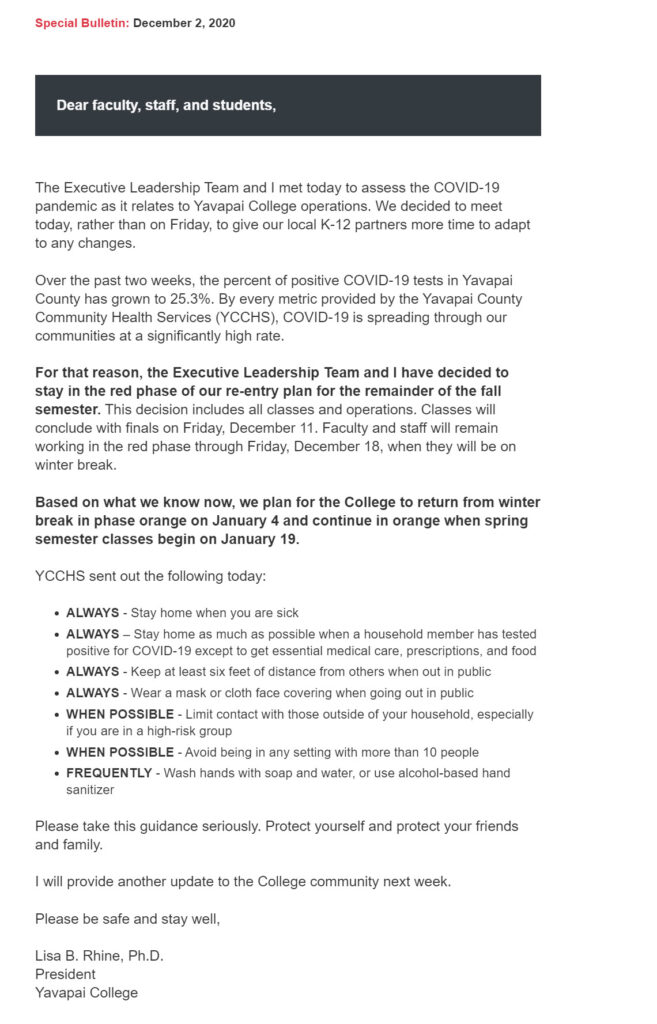
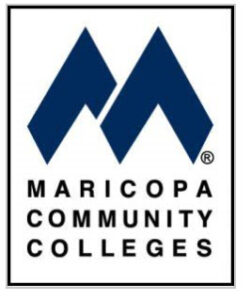 According to an article written by Rachel Leingang in the December 1, 2020 Arizona Republic, enrollment at the Maricopa Community Colleges dropped this fall by 14.5% when compared to last fall. The Maricopa Community Colleges have seen steadily declining enrollment since 2010.
According to an article written by Rachel Leingang in the December 1, 2020 Arizona Republic, enrollment at the Maricopa Community Colleges dropped this fall by 14.5% when compared to last fall. The Maricopa Community Colleges have seen steadily declining enrollment since 2010. Arizona’s Attorney General sued the Arizona Board of Regents in September 2017, alleging the regents had disregarded a constitutional provision that requires state universities to be as close to free as possible. According to the lawsuit, over a 15-year-period the regents had raised tuition from about $2,600 a year to as much as $12,228 a year for in-state students.
Arizona’s Attorney General sued the Arizona Board of Regents in September 2017, alleging the regents had disregarded a constitutional provision that requires state universities to be as close to free as possible. According to the lawsuit, over a 15-year-period the regents had raised tuition from about $2,600 a year to as much as $12,228 a year for in-state students.
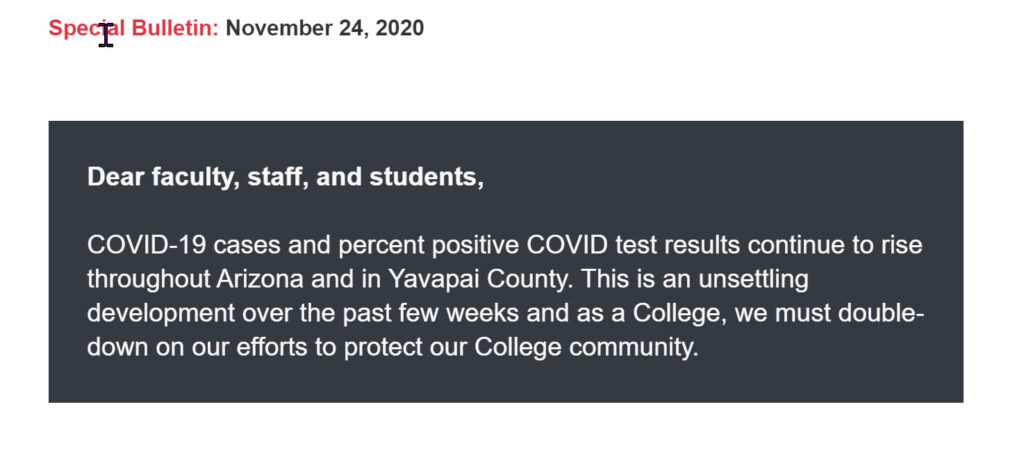
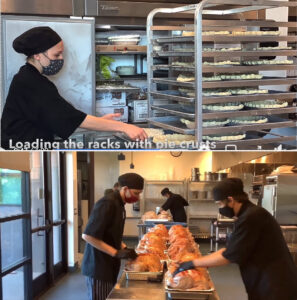 According to Facebook postings, the Yavapai Community College Culinary Institute cooked 63 turkeys and made up 47 complete dinners. Ten of the cooked turkeys are to be donated for distribution to local families in need.
According to Facebook postings, the Yavapai Community College Culinary Institute cooked 63 turkeys and made up 47 complete dinners. Ten of the cooked turkeys are to be donated for distribution to local families in need.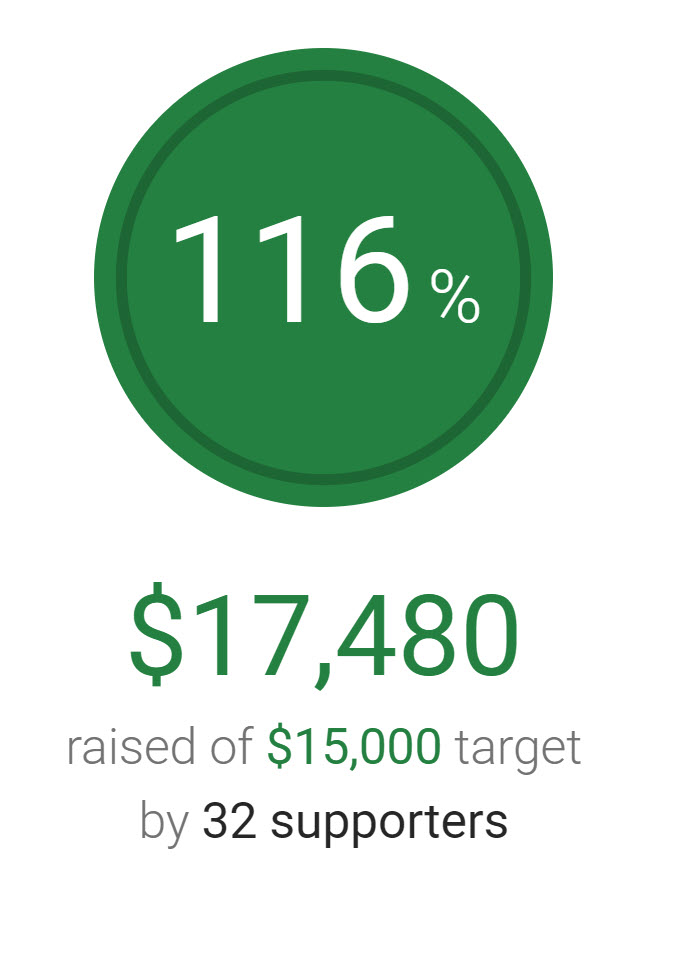
 In May 2020, the Yavapai Community College District Governing Board increased College president Lisa Rhine’s base salary by six percent. At the time, the vote was 4-1 (Chevalier dissenting) with the majority explaining the large increase was deserved because Dr. Rhine did not have a salary increase in her first year. (See video clip below for verification.)
In May 2020, the Yavapai Community College District Governing Board increased College president Lisa Rhine’s base salary by six percent. At the time, the vote was 4-1 (Chevalier dissenting) with the majority explaining the large increase was deserved because Dr. Rhine did not have a salary increase in her first year. (See video clip below for verification.) 
 holding a hybrid meeting in January 2021 rather than continue as it has for several months with all members on zoom. Third District Representative Paul Chevalier argued that with Covid cases increasing, the risk of transmission was too great if the Board held a face-to-face meeting. Moreover, according to him, the benefits of a face-to-face meeting could not outweigh the danger of the older members of the Board being infected. He said in arguing that the meetings remain all zoom that “in fairness to everyone and to help save my life, … if [I get Covid] there’s a 90 percent chance that . . . [I] will die.”
holding a hybrid meeting in January 2021 rather than continue as it has for several months with all members on zoom. Third District Representative Paul Chevalier argued that with Covid cases increasing, the risk of transmission was too great if the Board held a face-to-face meeting. Moreover, according to him, the benefits of a face-to-face meeting could not outweigh the danger of the older members of the Board being infected. He said in arguing that the meetings remain all zoom that “in fairness to everyone and to help save my life, … if [I get Covid] there’s a 90 percent chance that . . . [I] will die.”